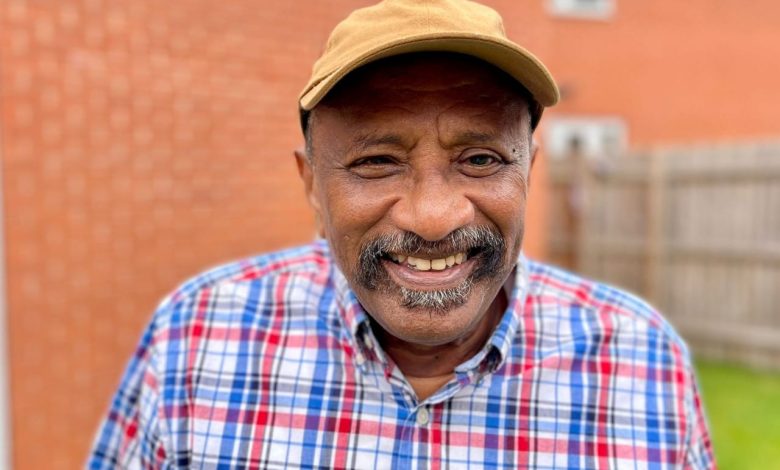Poet Wad Al-Mamoor :Creative people have essential role in the post-war

* Sad for my books, possessions, and my garden
Sudan Events- Interview: Magda Hassan
Poet Mustafa Wad Al-Mamoor wrote a new poem in the form of a letter to his three daughters, with an accurate description of their home and the devastation that befell it. In the poem, he talked about the garden of the house that was destroyed by Dana, and about his books, pictures, possessions, and memories that were tampered with by evil hands. The poem even touched on the post-war conditions with sad parental feelings. In this space, the poet Mustafa Wad Al-Mamoor tells his personal experience with the war. He graduated from the Faculty of Agriculture, Alexandria University. Wad Al-Mamoor worked as an agricultural engineer at the Ministry of Agriculture. He immigrated to the Kingdom of Saudi Arabia and worked there in the same specialty.
He published the collection pulse of the letters “Nabd Al-Horouf” and the collection “Wad Al-Mamoor.” Preparer and presenter of an agricultural program for a number of different media outlets
* You wrote a poem that expresses the extent of the devastation in your life and the country.
* Tell us about your personal experience with war?
The most difficult thing in the war was, according to my personal experience, the suddenness that happened, and no one expected or arranged its situation. We made a journey full of dangers to Egypt.
I did not expect it to last much longer than a month, so we did not take with us our possessions that we had been collecting for years.
I made my own library that contained many books. I keep a book from her, I am sad for her
Likewise, in my creative life, I used to document any encounter in the media or an encounter I presented.
I kept documenting all of that, which I left behind and was scattered by the invaders. Also, one of my hobbies was photos. I kept very many photos.
What about your famous garden?
I am most sad for my garden and my flowers that I carefully chose, lemons, herringbone, and the flowers that I love must have died from lack of care. Personal experience is very bitter, the last of which is the arduous journey, days of crowds, in a place where there are no services or bathrooms. I stayed for days in Egypt to rest, and I happened to have a visa for Britain. I left for my son. .
All countries have become difficult for the Sudanese.
The most difficult thing is to disperse the family, my sons and daughters, and my family, every person in the country.
* What are the future effects of this war on the arts?
The war has future effects on the country and all the infrastructure has been destroyed.
It is not between two groups seeking power. It is greater than that targeted citizen. Restoring the infrastructure, even if it provides the possibility, takes time.
The most important thing is to sweep out the political staff, as they have a fundamental role in what is happening.
* How do you see the suffering of creative people with war?
The suffering of creative people is many and painful. They were exposed to difficult circumstances, especially the elderly.
Some of them are still under bombardment.
Each person has his own circumstances, and this has an impact because their suffering is greater than others.
They preserve a beautiful history and memories, all of which they lost while they are with people in danger.
I believe that they are essential in the post-war phase.
Their presence is very important. They are among the people who It will contribute to restoring the new Sudan
*What are the repercussions of this war on culture and the arts?
Certainly, the war has its future repercussions on the arts, especially since it targeted Sudan’s culture and arts. It struck libraries, the archives, radio and television, and the nation’s memory, the greatest destruction of our culture and antiquities.



